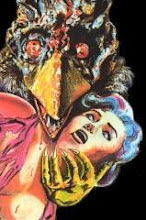 Yakuza Moon: Memoirs of a Gangster's Daughter was advertised as offering a rare female glimpse into the world of Japanese organized crime. I thought it would make a good follow up to Tokyo Vice, which I read and wrote about earlier this month. Whereas Tokyo Vice offered a male outsider perspective on the yakuza, I was hoping Yakuza Moon would present a female insider take on the whole thing. You can probably tell by the way I'm phrasing all this that Yakuza Moon didn't quite live up to my expectations.
Yakuza Moon: Memoirs of a Gangster's Daughter was advertised as offering a rare female glimpse into the world of Japanese organized crime. I thought it would make a good follow up to Tokyo Vice, which I read and wrote about earlier this month. Whereas Tokyo Vice offered a male outsider perspective on the yakuza, I was hoping Yakuza Moon would present a female insider take on the whole thing. You can probably tell by the way I'm phrasing all this that Yakuza Moon didn't quite live up to my expectations.It's not that Yakuza Moon turned out to be an awful book. It's got plenty of good stuff going for it like a fast-paced plot, readability, and enough seedy situations and sleazy characters to fill a novel twice its size. So the problem's not so much the book itself (which was alright) so much that it's falsely advertised. True, the author's dad was a yakuza, as are many of the men she goes on to date or become involved with, but it's much less about yakuza and much more about the author's personal struggles.
And there are many struggles to be had! At times this book reads like a bad after school special as the author, Shoko Tendo, struggles with everything from speed addiction to domestic abuse. Tendo's memoir was initially written for a Japanese audience and this is evident in her sparse descriptions of her native culture. Whereas I felt that the descriptions of Japan were some of the best parts of Tokyo Vice, I felt that Yakuza Moon suffered from a poorly drawn setting.
In Tendo's defense I understand that this book was probably just as much of a therapeutic exercise for her to work through her previous trauma as it was a labor of creative love. In the intro to the paperback edition Tendo writes about letters she has received from readers who related to her struggles. This edition of the book also includes an afterword from another author/yakuza child who writes about how much her related to Tendo's struggles. So there's definitely an audience for this book and if you're a part of that audience then more power to you. However, I have a feeling that most average Joes/Janes would be better served elsewhere.






